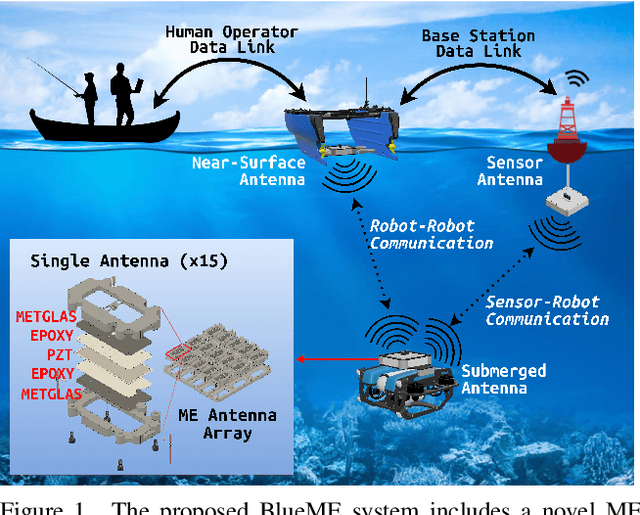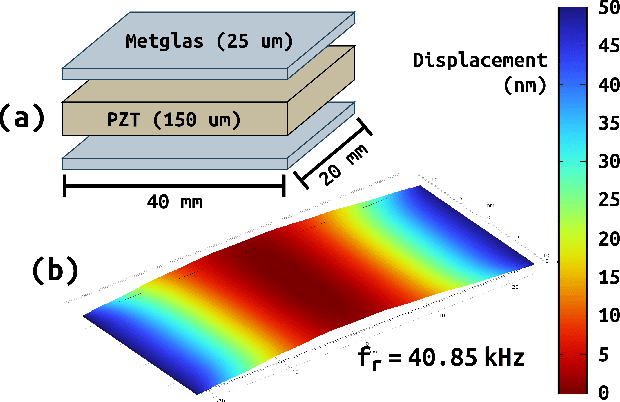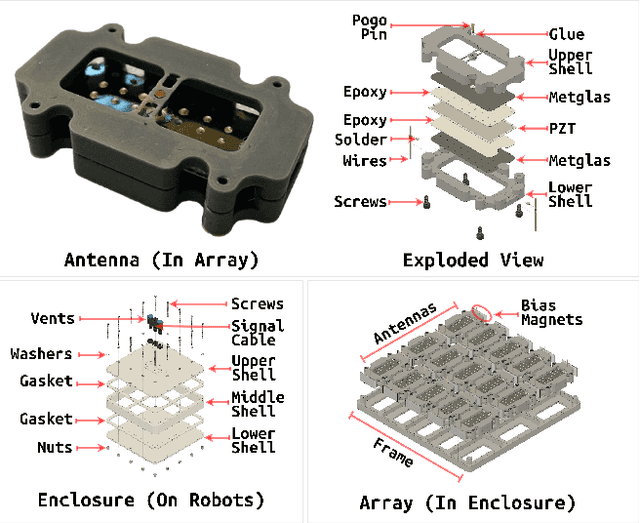Sultan Mahmud
BlueME: Robust Underwater Robot-to-Robot Communication Using Compact Magnetoelectric Antennas
Nov 14, 2024



Abstract:We present the design, development, and experimental validation of BlueME, a compact magnetoelectric (ME) antenna array system for underwater robot-to-robot communication. BlueME employs ME antennas operating at their natural mechanical resonance frequency to efficiently transmit and receive very-low-frequency (VLF) electromagnetic signals underwater. To evaluate its performance, we deployed BlueME on an autonomous surface vehicle (ASV) and a remotely operated vehicle (ROV) in open-water field trials. Our tests demonstrate that BlueME maintains reliable signal transmission at distances beyond 200 meters while consuming only 1 watt of power. Field trials show that the system operates effectively in challenging underwater conditions such as turbidity, obstacles, and multipath interference -- that generally affect acoustics and optics. Our analysis also examines the impact of complete submersion on system performance and identifies key deployment considerations. This work represents the first practical underwater deployment of ME antennas outside the laboratory and implements the largest VLF ME array system to date. BlueME demonstrates significant potential for marine robotics and automation in multi-robot cooperative systems and remote sensor networks.
Acceptance of COVID-19 Vaccine and Its Determinants in Bangladesh
Mar 28, 2021



Abstract:Background: Bangladesh govt. launched a nationwide vaccination drive against SARS-CoV-2 infection from early February 2021. The objectives of this study were to evaluate the acceptance of the COVID-19 vaccines and examine the factors associated with the acceptance in Bangladesh. Method: In between January 30 to February 6, 2021, we conducted a web-based anonymous cross-sectional survey among the Bangladeshi general population. The multivariate logistic regression was used to identify the factors that influence the acceptance of the COVID-19 vaccination. Results: 61.16% (370/605) of the respondents were willing to accept/take the COVID-19 vaccine. Among the accepted group, only 35.14% showed the willingness to take the COVID-19 vaccine immediately, while 64.86% would delay the vaccination until they are confirmed about the vaccine's efficacy and safety or COVID-19 become deadlier in Bangladesh. The regression results showed age, gender, location (urban/rural), level of education, income, perceived risk of being infected with COVID-19 in the future, perceived severity of infection, having previous vaccination experience after age 18, having higher knowledge about COVID-19 and vaccination were significantly associated with the acceptance of COVID-19 vaccines. Conclusion: The research reported a high prevalence of COVID-19 vaccine refusal and hesitancy in Bangladesh. To diminish the vaccine hesitancy and increase the uptake, the policymakers need to design a well-researched immunization strategy to remove the vaccination barriers. To improve vaccine acceptance among people, false rumors and misconceptions about the COVID-19 vaccines must be dispelled (especially on the internet) and people must be exposed to the actual scientific facts.
 Add to Chrome
Add to Chrome Add to Firefox
Add to Firefox Add to Edge
Add to Edge